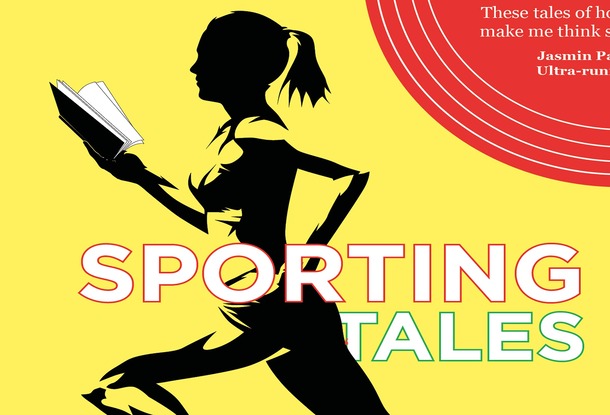Hopeful tales of sport
Sporting Tales – our new book, just published – is about finding more imaginative ways to engage with the unprecedented challenges our times, and brings together a huge range of insight and imagination from elite athletes, academic experts, poets, artists and activists.
The current moment seems more precarious than ever, standing on the edge of potentially irreversible ecological decline and in the grip of toxic social divisions. Athletes engaged in outdoor physical exertion find themselves especially exposed, with their health and lives under threat from the climate extremes of a heating planet, as well as the air pollution from the burning of fossil fuels.
But sport has an extraordinary ability and opportunity to mobilise its mass audience and appeal for change.
Sporting Tales is part of a bigger project, and the fifth volume of essays and stories curated by the New Weather Institute following: There was a Knock at the Door, Knock Twice, Knock Three Times, and Contagious Tales. It includes contributions from several members of the Cool Down – sport for climate action network.
There’s something about people involved in sport that gives them a unique advantage over others when it comes to doing difficult or seemingly impossible things. Statistically, the odds in competitive sport are always stacked horribly against you – typically, there can only be one winner.
But that doesn’t stop millions trying. Fans too are often used to living in hope, however forlorn, for their team or favourite athlete to win, sometimes for years or a lifetime, but it doesn’t stop them.
There is always too, a kind of ‘go for it’ mentality that celebrates simply trying. Companies have been quick to exploit that sense, aligning themselves with its indomitable spirit to sell more stuff with feel-good slogans like ‘just do it’, and
‘impossible is nothing’ (it’s not, of course – according to the laws of thermodynamics impossible is very much something). And, indeed, some of the brightest glimmers of hope in recent years scarred by upheaval, war, pandemic, and division have come from sport.
Taking the knee, wearing the rainbow and calling out child food poverty are all ways in which sport has driven awareness of prejudice and injustice, and pushed social progress.
But the opposite is also true. At the elite level especially, sport has allowed itself to be a billboard for corrosive commerce, promoting everything from junk food to gambling. Violent regimes with appalling human rights records are allowed, brazenly, to use teams and events that command some of the biggest media audiences in the world to ‘sportswash’ their reputations. Top level sport itself has become the favoured public relations cloak of those who have the most to hide.
“Sport is losing to climate breakdown and climate criminals, but has always been a coliseum of social and political change. Can sport rise to the occasion? These tales of hope make me think so.” Jasmin Paris, champion ultrarunner and the first woman to complete the infamous Barkley Marathons
“Sport has many stories to tell; good and bad. Sporting Tales is a stadium full of better stories about surviving and thriving in a troubled world.” Melissa Wilson, Team GB rower and co-founder of Athletes for the World
“An uplifting and important collection of tales that epitomise the “think global, act local” approach to tackling systemic societal and environmental challenges through the lens of sport. A must read.” Claire Poole, founder, the Sport Positive Summit
“Story is about the very patterns of life. We recognise the narrative arcs of daring tales, the reticence to change habits at first, the heroic journey when prompted, the hope that follows action, the evil antagonist, the path back home But sport is a bit different, the losses are inevitable, even for the good. And they happen a lot. Sport is central to modern culture, and these Sporting Tales are a fine, wise and fabulous insight into how sport can change the world, and how it too mirrors those very economic and social structures in their best and worst ways.” Jules Pretty, Professor of Environment and Society at the University of Essex and author of The Low-Carbon Good Life
“We all know that sport is sometimes thought of as a battlefield. Orwell once likened it to ‘mimic warfare’. But increasingly the struggle is for the soul and purpose of sport: torn between regenerating communities, building health and social relationships as opposed to providing a propaganda vehicle for undemocratic regimes and major polluters. This beautifully written collection shows that new stories and narratives of how the spirit of sport is being reclaimed can yet save everything we love about sport from those whose values threaten our very existence.” Professor Peter Newell, Sussex University.
You can buy a copy of the book – Sporting Tales: 21 new stories for a troubled world, edited by Andrew Simms – getting your own pristine new copy, for yourself or as a present for someone else, by going to the website of our publishers. The Real Press.

